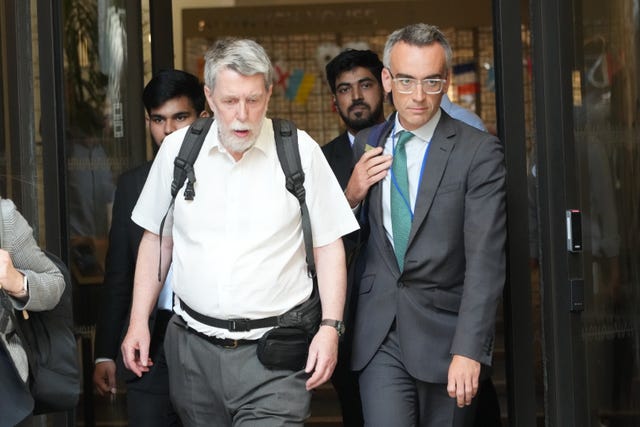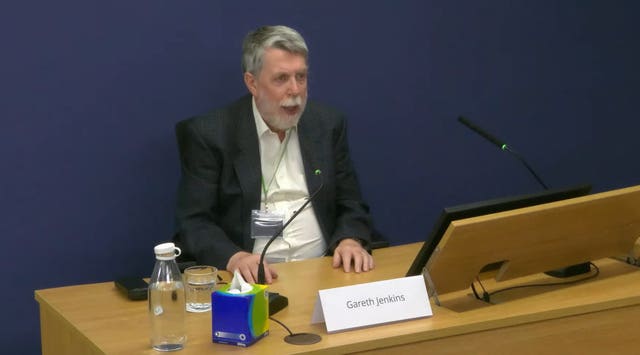Ex-Fujitsu engineer was ‘happy’ with evidence he gave at subpostmaster’s trial
Gareth Jenkins’s evidence about the Horizon system was used in the prosecutions of many subpostmasters, including Seema Misra.

A former senior Fujitsu engineer “felt happy” at the time with evidence he gave as part of a trial which led to a wrongly convicted pregnant subpostmaster being jailed, the Post Office Horizon IT Inquiry heard.
Gareth Jenkins’s evidence about the Horizon system was used in the prosecutions of many subpostmasters, including Seema Misra, who was given a 15-month prison sentence in November 2010, when she was eight weeks’ pregnant.
A transcript of parts of Ms Misra’s trial was shown to the inquiry on Thursday, and Mr Jenkins was questioned about his evidence, during which he said the Post Office’s help desk “wasn’t actually very good at passing things on when they should have been” and added he had not gone through Ms Misra’s call log with the help desk before giving evidence.

Mr Jenkins worked at Fujitsu, formerly known as International Computer Ltd, for the whole of his professional career before retiring in 2015, and had been a “distinguished engineer” since the mid-1990s.
Previous witnesses to the inquiry claimed Mr Jenkins may have committed perjury due to his failure to disclose knowledge of bugs in the Horizon system to subpostmasters.
He is being investigated by the Metropolitan Police on suspicion of perjury and perverting the course of justice.
During Ms Misra’s trial, Mr Jenkins was asked “if a computer problem led to a problem with the actual figures with the accounts, would that problem manifest itself to staff at the Post Office”?

According to the transcript, Mr Jenkins replied in court: “Clearly if there’s a problem in the accounts and there were losses and things like that showing, I would expect the staff to be complaining to the help desk to investigate what’s gone on and that might trigger an investigation by ourselves.”
The former Fujitsu engineer told the inquiry: “That was my understanding of how things were supposed to work.
“I now realise that the Post Office help desk wasn’t actually very good at passing things on when they should have been.”
Mr Jenkins was taken through calls made by Ms Misra to the Post Office’s help desk.
Counsel to the inquiry Jason Beer KC asked if he accessed the call records as part of his work to prepare to give evidence in Ms Misra’s case.
Mr Jenkins said “no I did not”.

Mr Jenkins was also asked if there was any “prohibition or nervousness or ban” on revealing the existence of the “known error log” in legal proceedings.
He replied “not that I’m aware of”.
Asked by Mr Beer if he was “untroubled by and happy with the evidence” he gave at Ms Misra’s trial, Mr Jenkins said: “At the time I was, I clearly appreciate now that it wasn’t as good as it should’ve been but at the time I felt happy with it.”
Mr Jenkins received an email from Fujitsu colleagues which said he could not act as an expert witness anymore in 2013, the inquiry heard.
Mr Beer asked if he was ever told about the legal advice that had concluded “in broad terms that you had broken your duties to the court and had given evidence which was unreliable and therefore you could not be relied on for these reasons”.
Mr Jenkins replied “no I didn’t understand any of that until 2020”.
Earlier on Thursday, Mr Jenkins was questioned over a series of emails he sent and apologised during his evidence twice.
He sent an email on March 1 2010 discussing the case of Ms Misra, which said she saw an article in Computer Weekly “indicating that Horizon was unreliable and she decided to jump on the bandwagon”.
Mr Jenkins apologised during the inquiry, saying “that’s totally inappropriate wording on my part for which I apologise”.
Another email was shown to the inquiry in which Mr Jenkins commented on a report and said “this is another example of postmasters trying to get away with ‘Horizon has taken my money’”.
Mr Jenkins said: “That’s me very poorly trying to summarise what I thought was being laid out in the email trail below and I apologise for the wording that I used there.”
In another email, Mr Jenkins was commenting on a separate report when he said “we don’t really want to be seen to be undermining a POL (Post Office) prosecution!”.
The email, sent on January 27 2010, said: “I agree there probably needs to be some further investigation here. However I’m also aware that this is potentially highly political, therefore I’m not sure how best to address this. We don’t really want to be seen to be undermining a POL prosecution!”
Mr Jenkins said he was “wanting guidance as to what actually we should be doing”.
On Wednesday, Mr Jenkins admitted it was “inappropriate” for him to modify a draft witness statement to remove a reference to weaknesses in the Horizon system at the request of the Post Office.
A Post Office investigator had warned the company could be “embarrassed at court” if an acknowledgement of the software’s failures featured in the statement, which was requested in connection with allegations made against a subpostmaster in 2006.
Mr Jenkins also told the inquiry he thought any remote access would have been visible to subpostmasters and could be distinguished from changes made by third parties, although he acknowledged he knew it was “theoretically possible” this might not always be the case.
In his third witness statement for the inquiry, Mr Jenkins claimed Post Office lawyer Warwick Tatford had looked over a draft of his witness statement for Mrs Misra’s trial and recommended he “make some points more strongly in favour of the Post Office”.
Mr Tatford “wanted me to say it looked as though Mrs Misra had stolen money rather it was incompetence”, Mr Jenkins wrote.
On Tuesday, he told the inquiry he did not recall receiving a letter from law firm Bond Pearce sent to Fujitsu in 2005 laying out the duties of an expert witness, and said he would “have done things differently” in later cases – including that of Ms Misra – if he had.
More than 700 subpostmasters were handed criminal convictions between 1999 and 2015 when errors in the Horizon IT system meant money appeared to be missing from many branch accounts when it was not.
It has been branded the biggest miscarriage of justice in British legal history.
Mr Jenkins is due to give evidence for four consecutive days up to Friday, the longest run of questions any witness has faced so far.
The inquiry continues.





